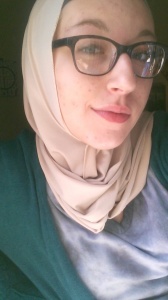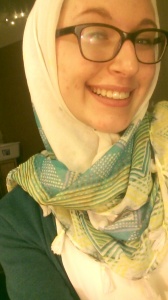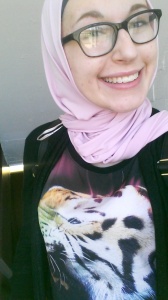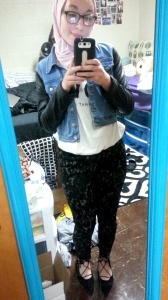As an Honors freshman at Central Michigan University, I have to complete a Personal Development Project which includes ten events I completed that were a meaningful stretch for me. One of the events we are lucky to have the program arrange for us is Hijab Week. I jumped at the chance to do something so unique and hopefully learn a lot. This is my experience with Hijab Week at CMU.
From November 2nd to November 8th, I took part in Hijab Week, meaning I wore the traditionally Muslim headscarf as well as modest clothing when in front of men, which basically meant I never left my room without the hijab on. A group of twenty to thirty female Honors students participated, so it wasn’t too unusual to see hijabs around north campus during the week, but in other areas people were oblivious to the activity, which made it more interesting. I chose this activity because I know how anti-Islam sentiment is a pretty significant issue in our country, and as an accepting, open-minded individual I wanted to immerse myself in a part of Islamic culture in order to foster a better understanding for myself and for those around me.
The week began with an information session, in which a Muslim professor named Duha explained the significance of wearing the hijab and some of the rules associated with it. A really important point she touched on was that it is not offensive to try the hijab. Many students, including myself, were nervous with doing anything that could be considered cultural appropriation. Duha explained that as long as we were wearing the hijab with respect and expressing our motives to engage in cultural understanding, the Muslim community would welcome our trying of the hijab. I thought this was really important to touch on, because, as a white female student with privileges like never being questioned or discriminated against because of how I express myself culturally, I am quite detached from other cultures, especially ones with such a complex history in this country. She lent us some scarves and helped us learn how to tie them, and off we went. The first day I really didn’t plan ahead enough, as I didn’t realize I still had no idea how to put on a hijab. I had difficulty with my pins, but when I borrowed some safety pins from a friend I was able to secure the scarf on my head and focus my concerns on the cultural experience.
I acknowledge it is a little difficult to get the full experience without following the other behaviors of Muslim women, but I took the point as focusing on understanding the reasoning behind wearing a hijab in an effort to de-stigmatize it. I tried to keep this in mind, and I hoped each day that no one would take offense to me, without knowing why an obviously white girl was wearing a hijab. The first few days I was definitely hyper-aware that I was wearing it. I can laugh thinking about that Monday when I walked into my 10AM and noticed people glancing at me and practically immediately started to sweat and get uncomfortable from their probably natural but seemingly never-ending looks at me. Over the course of the week only one person knew about the Honors activity, and not a single other student asked me about it. Whether this was out of their intimidation, discomfort, or neglect to care, I don’t know, but either way I would’ve rather had people ask me so I could express my passion for acceptance. Even though I wasn’t very vocal about why I was doing it to anyone besides my friends and family, I think the message was still communicated and the point of acceptance was made. It’s hard to not loosen up to the sight of a hijab when someone you know is not Muslim is wearing it with ease. I hope that my privilege doesn’t detach me from any progress in this sense.
My main struggles of the week were just finding something to wear that was not too tight (I ended up wearing skinny jeans with a long cardigan because I had no other options) and managing in the random heatwave Michigan decided to throw at us. I have no major complaints, though, about my week. I actually enjoyed wearing it, and I felt it just become a natural part of my ensemble each day, and it was awesome not having to worry about what my hair looked like. After the week was over, on Sunday, we had a reflection session and I got to hear many students’ points of view on the week. Many of them had complaints and confessed to not wearing it the whole time. I have to admit I was a little disappointed at how many of them seemed to miss the meaning of wearing the hijab, and continued to view the practice through a Westernized point of view, something so outside of the social norm that they couldn’t even relate to the principle behind it. Then again, I’m sure many of them were touched like I was, but just didn’t vocalize it.
I got a lot more out of this activity than I thought I would. Western women see the hijab as a way Muslim men control women, yet Muslims see the sexualized female norm this way, since we are pressured to look good to impress men and other women. I have a greater appreciation for the values behind the hijab having worn it for a week. I found myself less self-conscious wearing it. As a fashion student, I am always concerned about the way my outfit looks, but with the hijab I found myself more concerned with expressing who I was rather than what my body looked like. It is eye-opening to realize Western beauty standards are very different from other cultures, and often we allow these standards to unnecessarily control our body image, mindset, and behaviors. The hijab is typically empowering to the women who wear it, and it is a way of declaring that the woman’s husband is the only one who deserves to know her intimately. I find this to be beautiful. Most Americans view other cultures with a strong bias, and due to a long history of foreign affairs their view and treatment of Islam is filled with even more contempt than for other cultures. We would all benefit and our nation would progress if we took the initiative to understand other cultures, and realize cultural differences are cause for celebration, not separation. Although I can understand the wearing of the hijab, it is not something I would personally follow. I am not a religious person in general so I don’t follow any set of guidelines for behavior. I will definitely always remember my experience with Islam, though, and remember that my confidence should stem from the beautiful person that I am and to not put such a focus on an ideal appearance. These are values that we can all benefit from. We all benefit from living in such a diverse society, and we do not necessarily have to participate in something like Hijab Week to gain better recognition and empathy for others’ cultural experiences- we just need to take it upon ourselves to be educated.
It is so valuable to recognize how diverse the cultures in this world are in order to foster a more welcoming and cooperative society. I am so proud to have taken part in this activity that helps advocate for social justice and shown myself and others that there is no reason to view other cultures with a sense of fear or distance. We also cannot generalize the things that we learn about others. Not all Muslims wear the hijab, and this shows the wide diversity that exists even within a single group. We need to realize the world is so much larger than just ourselves and our experiences, and recognize the privileges we have that have allowed us to live with a sense of belonging in our communities, and extend this to everyone. When we realize others do not have the same privileges, we can help them achieve the equality of protected rights and happiness that they deserve and help foster a safe environment for self expression and cultural practice. This was one of my favorite activities I did for my project and I am glad I am offered such enlightening experiences, because in no other situation would I ever think to wear a hijab for a week and discover my capacity to empathize with others. I learned even more how to put my accepting beliefs into practice: to be unbiased, to educate myself, and to be open to new experiences and types of people. By doing this, we can only grow as individuals, thus better enabling ourselves to connect to the global society around us and contribute to its social progress in a way that benefits all of its members.



